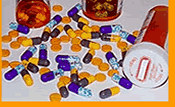 |
|
| Find Services | News & Information | Rules & Regulations | Business Information |
Reference Center
 |
|
| Government at Your Fingertips | |
Download the Adobe Acrobat Reader to access PDF files on this Web site
Contact the
Drugs and Medical Devices Group

Dietary Supplements Containing Epehdrine and Herbal ProductsRules for Dietary Supplements Containing EphedrineMany Americans view herbal and dietary supplements as useful therapeutic agents for treating a wide variety of ailments. Indeed, many potent and effective prescription drugs are derived from plant and animal sources. Yet, so are familiar poisons such as hemlock, strychnine, and belladonna. Many people assume that "natural" products are inherently safe and that they may be taken without risk. However, natural products come with a full range of potential benefits and risks as do synthetic products. Most dietary supplements are safe when consumed as directed, while others are potentially harmful. Currently, herbal and dietary supplement products are for the most part unregulated and there are few federal or state standards for manufacturing or quality controls. Consumers who wish to rely on herbal or dietary supplements should educate themselves about the potential benefits and risks associated with the products. Always try to check out sources of information independent of promotional literature used to market the products. And, develop a healthy skepticism for information on the Internet, which is virtually unregulated. Because of recent changes in federal law, numerous new supplements with significant physiological effects (such as hormones) have entered the market without any safety studies (see related news release below). Here are a few guidelines to consider: 1. "Natural" does not necessarily mean "safe." 2. Herbs and dietary supplements are not miraculous "cure-alls." They may have been used for centuries, but substantial data on effectiveness and safety of long-term use are often lacking. If a claim sounds too good to be true, it probably is. Beware of sensational names, claims, and other misinformation. 3. If you eat a normal diet, following the Department of Agriculture's food Guide Pyramid, many people probably don't need extra vitamins, minerals, or dietary supplements. However, the Centers for Disease Control recommends that women of child-bearing age (15-44 years) consume a 400 mcg folate supplement every day in addition to a well balanced diet. 4. Herbal medicines can interact with OTC and prescription drugs to cause harmful effects. 5. Don't use herbs to self-treat serious or persistent medical conditions. Herbs generally have mild effects and there are no proven herbal cures for cancer or AIDS, nor are there herbs that act as aphrodisiacs. 6. Don't use herbs or dietary supplements if you are pregnant or nursing or give to infants or young children without consulting your doctor. 7. Do not confuse herbal medicine with homeopathy, which utilized products containing few or no active ingredients. 8. Do not exceed the recommended directions. If you have an adverse reaction to a product, stop it immediately and consult a healthcare professional. Report adverse reactions to the Drugs and Medical Devices Group by leaving a voice mail message at 1-888-839-6676 or by speaking with a representative at (512) 834-6755. Adverse reaction can be reported to the U.S. Food and Drug Administration's in the FDA's MEDWATCH Program (see the Adverse Event Monitoring System link below). 9. If you have questions about herbs or dietary supplements,
feel free to call Karen Tannert, R.Ph., Drugs and Medical Devices Group,
at
Related Topics and Associated LinksNew Bodybuilding, Sleep Inducing Products Contain Floor
Stripper Chemical. Herbal
and Dietary Supplements that Consumers Frequently Inquire About.
An
FDA Guide to Dietary Supplements. Adverse
Event Monitoring System. FDA
Page Containing General Information about Dietary Supplements.
Office of Dietary
Supplements
|
||||||||||||||||||||||||||||||||||||||||||||||||||||||||||||||||||||||||||||||||||||||||||||||||||||||||
|
Last Updated September 26, 2006 |
||||||||||||||||||||||||||||||||||||||||||||||||||||||||||||||||||||||||||||||||||||||||||||||||||||||||
| Contact Us | Compact with Texans | Homeland Security | Internet Policy | Site Map | Statewide Search | Texas Online |
